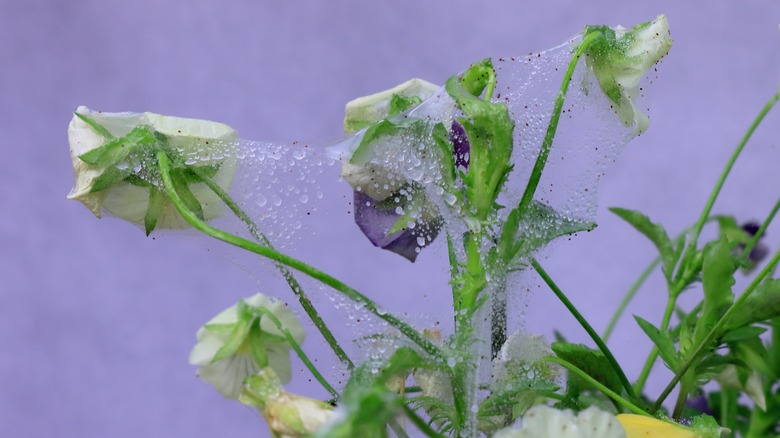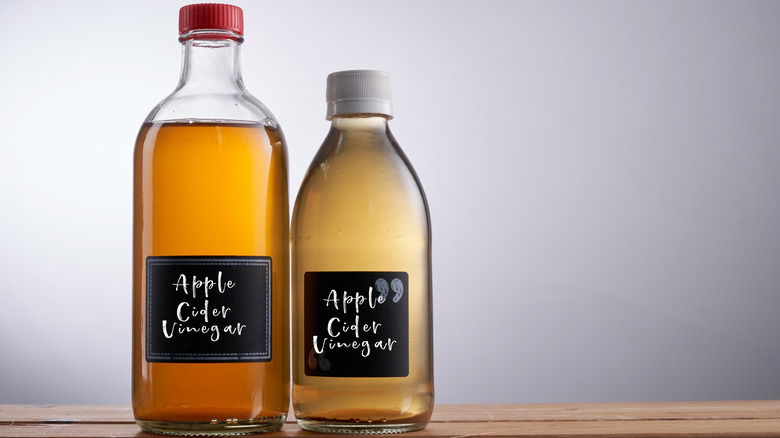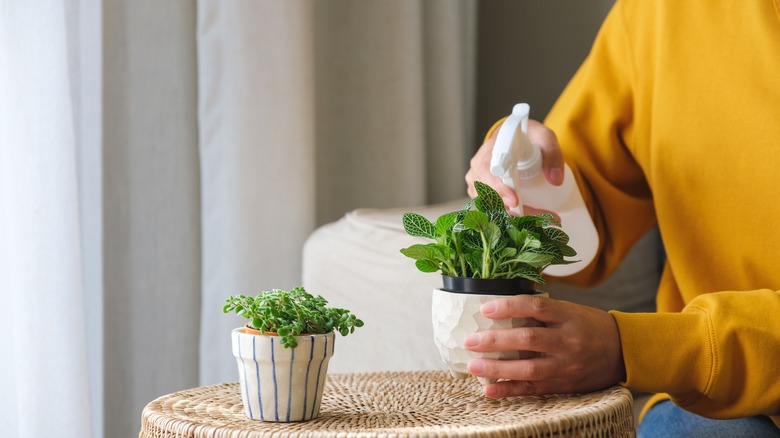This Kitchen Essential Is The Solution To Your Houseplant Pest Problems
Dealing with pests on houseplants is the bane of any plant enthusiast's existence. These tiny troublemakers crash the green party, munching on leaves like they're at an all-you-can-eat buffet. Aphids, spider mites, and mealybugs are some of the most notorious offenders that can pose quite a problem to remedy. While being unsightly to look at, they also disrupt your plants' overall health. Armed with sprays and a touch of desperation, you become the reluctant bouncer trying to restore peace in your potted paradise. It's not exactly a plant party; it's more like an insect invasion. Nevertheless, mitigating the problem is essential to your plants' health and survival, so you'll need to choose your weapon carefully to keep bugs at bay. One unsuspecting eco and budget-friendly solution awaits you in your pantry: apple cider vinegar.
Apple cider vinegar is a great solution for eliminating pests over some other popular methods like neem oil or sticky traps. Its natural composition offers an effective remedy in contrast to the oily residue of neem oil or the adhesive nature of sticky traps. Apple cider vinegar serves as a mild yet potent deterrent. Moreover, neem oil can become an expensive option compared to vinegar, especially if you have many infected plants while sticky traps are just unsightly to have in your home. Nobody wants to look at a sticky, jaundiced bug graveyard. Opting for apple cider vinegar ensures a cleaner, more gentle approach to safeguarding your plants, avoiding the potential drawbacks associated with alternative methods.
How to use apple cider vinegar to banish pests
To create an effective apple cider vinegar solution for tackling pest infestations on houseplants, start by mixing a simple concoction. Combine a quart of water with twelve ounces of vinegar and pour it into a spray bottle. This ratio strikes a balance, providing enough acidity to deter pests while ensuring it's diluted enough not to harm your plants. Optionally, add a few drops of mild dish soap to the mix; this helps the solution adhere to the pests and disrupts their outer membranes, enhancing its effectiveness. Ensure thorough mixing to achieve a homogeneous solution. Consequently, this homemade remedy harnesses the natural pest-repelling properties of apple cider vinegar without resorting to harsh chemicals.
Once your solution is ready, apply it liberally to the affected areas of your houseplants. Begin by testing a small, inconspicuous section of a leaf to ensure your plant responds well to the treatment. If all is well, then proceed by spraying the solution on the top and bottom of leaves, along with stems and the surrounding soil. Pay extra attention to areas where pests are most prevalent. It's crucial to reapply the solution regularly, especially after watering, as it can be washed away. Consistency is key in breaking the pest life cycle and killing both the pests and their larvae. Regular monitoring and timely application of this solution can contribute to a thriving, pest-resistant indoor garden.
Why apple cider vinegar works
Apple cider vinegar stands out as a potent remedy for abolishing pest infestations on indoor plants due to its natural acidity and versatile applications. The acidity in apple cider vinegar disrupts the feeding and reproductive cycles of various pests, acting as a deterrent without causing harm to most plants. It is particularly effective against soft-bodied insects like aphids, spider mites, and mealybugs. When applied as a solution, it not only serves as a direct repellent but also addresses issues like fungal growth on the plant's surface. This dual functionality makes it a great solution for getting rid of bugs on indoor plants before they spread to your entire collection of houseplants.
While apple cider vinegar is highly effective against soft-bodied pests, it may not be as potent against all types of insects such as ants. Some pests often have protective coatings that make them less susceptible to the acidic nature of the vinegar. Additionally, some plants may be sensitive to the acidity, and prolonged or concentrated use of the solution could potentially harm them. Therefore, it's crucial to test the solution on a small, inconspicuous area before widespread application and monitor the plant's reaction. If you notice your plants reacting negatively to the vinegar solution, refrain from using this method and try an alternative pest mitigating solution that is more amenable to your sensitive plants such as a homemade garlic spray or diatomaceous earth.


